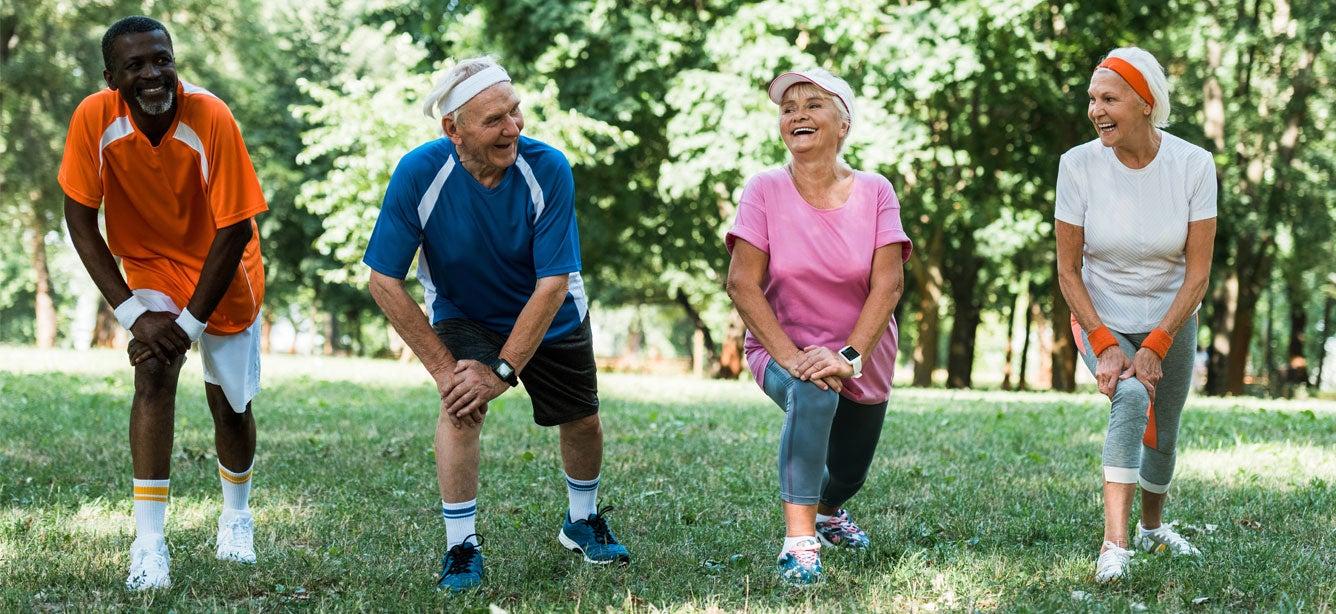Frequently Asked Questions for Administration for Community Living Grantees Implementing Better Choices, Better Health Online

Canary Health helps health plans, health care providers, employers, and others [e.g., recipients of Administration for Community Living (ACL) Chronic Disease Self-Management Education (CDSME) grants] improve the effectiveness and efficiency of their disease management/care management service for individuals with, or at risk for, a range of chronic diseases. This is accomplished by providing evidence-based digital therapeutic versions of proven, effective, in-person interventions.
Better Choices, Better Health® (BCBH®) is a 6-week, peer-to-peer lead, group-based digital intervention which helps adults with diabetes and other chronic conditions improve their lives, their relationships, their emotions, and their health and mental health outcomes. It is part of the CDSME suite of programs originally developed at Stanford University by Dr. Kate Lorig and her colleagues, and now managed by the Self-Management Resource Center. Self-management support approaches increase the participants’ self-efficacy – the confidence that a person can set and accomplish a specific goal.
- Who is the point person for grantees who wish to contact Canary Health?
Jonah Kaufman (jkaufman@canaryhealth.com) is the point person for grantees contacting Canary Health. Neal Kaufman (nkaufman@canaryhealth.com) should be copied on all messages.
If you are applying for Administration for Community Living/Administration on Aging funding opportunities focused on implementing chronic disease self-management education programs, contact Canary Health during the application process to make sure the program is an appropriate fit for your organization and capacity, learn about the partnerships that will be needed to successfully deliver the program, and clarify program costs.
- What is the difference between participants that “sign-up”, “show-up”, and “complete” the program?
- Sign-up: Individuals who have signed up for the program, but have not yet attended a session. (See question #12 for a description of the sign-up process.)
- Show-up: Individuals who attend at least one session demonstrated by actively participating in the session (e.g., take the lesson, complete action plan, post in the discussion center).
- Complete: Individuals that have completed at least four of the six sessions (by the same criteria described for a participant that “shows-up).
- Is there a set-up fee? (effective 10/1/2023)
No, there is no set up fee associated with the program for ACL clients.
- Is there an annual license fee? (effective 10/1/2023)
No, there is no set up fee associated with the program for ACL clients.
- How are contracts structured based on “sign-ups,” show-ups,” and “completers” (defined in question #2)?
We assume that all contracts will be for the length of the grant (e.g., 3 years) with the grantee retaining the option to cancel after one year if the program isn’t successful. We no longer have contracts based on sign-up. The preferred option is milestone-based, with a payment for show-up and a payment for completion. A fixed rate for show-up alone is possible, but only on a case-by-case basis.
- What is the cost for participants that “show-up” and “complete” the program (as defined in question #2)?
This cost is finalized with each grantee depending on several factors including:
- The routine per participant milestone-based payment is $225 at “show-up” and $225 at “completion.” Modification is possible depending on:
- The total number of participants; or
- The chosen eligibility determination approach (e.g., done by grantee or Canary Health; integrated with healthcare provider or plan).
- For more specific information, contact Katy Plant.
- Is there a minimum number of milestones for an ACL grantee’s 3-year contract?
Yes, the minimum number of milestones (combined show up and completers) over the length of the contract is 450. As an example, 450 milestones would be approximately 500 signs ups, 275 show ups, and 175 completers.
- Does Canary Health expect to be paid for participants who sign-up but don’t show-up?
Canary Health does not require that it be paid for participants who sign-up but don’t show-up. However, a grantee should expect to spend between $30-$50 on outreach per participants who show-up. While there is no requirement that Canary Health be involved in outreach, we are very willing and able to help on a case-by-case basis, with our fees to be negotiated depending on the scope of work required.
- What are the options for payment terms?
We view our relationship with a grantee as a long-term partnership where if the grantee is successful, we are successful. Our mutual goal is to create a scalable (significant number of participants each year) and sustainable (paid for by non-grant funding) service. We make a considerable investment in each partnership and need to know that we will make a reasonable return on each investment. Guaranteeing payment over the life of the contract with the ability to carry-over any unused milestones/slots beyond the contract’s original termination date is our preferred method of payment. 1/6th of the total payment is due at signing and thereafter every 6 months.
- What are the criteria for BCBH® program completion in the National Council on Aging’s (NCOA) National Chronic Disease Self-Management Education (CDSME) Database?
The completer rate is the percentage of participants that “show-up” to the workshop that attend 4 out of 6 BCBH® sessions.
The completion rate can be thought of as the BCBH® dose. It is based on the original Stanford University trials of the BCBH® workshop, where those that attended at least 4 workshop sessions improved the most.
- What outreach does Canary Health do to encourage participation and how can grantees be a part of that campaign?
Canary Health conducts digital and telephonic outreach to participants. This includes a campaign to remind those who “sign-up” to “show-up” to the first session. Those who “sign-up” can participate in a “session zero” designed and administered by Canary Health.
- Selected workshop system emails to increase engagement in BCBH®:
- Welcome e-mail
- 3 days after selecting workshop: Prompt to complete self-test
- 5 days before workshop start: Reminder email
- 3 days before workshop: Text reminder
- 2 days before workshop start: Reminder email
- Did not show-up by Wednesday of the first week: Live agent call
- First and second week of workshop: Supplemental facilitator reminder, text nudges to active participants, days 3-7: Reminder to post, complete action plan
- Weeks 4 and 5: Live call to those that have shown up but have not continued to engage.
Note: If a prospective participant doesn’t show-up by the Wednesday of the second workshop week, they are removed from the workshop and offered the opportunity to pick another start date.
ACL grantees are free to conduct additional outreach to encourage participant engagement. This can be considered on a case-by-case basis with or without Canary Health involvement.
- What is the process of signing people up? How does one enroll in BCBH®?
Participants learn about BCBH® from a variety of ways including email, printed materials, Interactive Voice Response (IVR) phone campaigns, and social media. All enrollment is completed online and is accessible by tablet, phone, or computer. After learning about BCBH®, participants visit an enrollment website branded to the host organization to complete basic eligibility criteria and select from a list of available workshops. Program enrollment is then confirmed by email.
- How does each grantee check for eligibility for the program prior to allowing a person to signup for the program? If there are codes involved, how are they checked? Essentially, how are they registered?
Eligibility criteria can be customized for the specific host organization and is finalized prior to launching the program. This includes the opportunity to customize if grantees are partnering with health care providers, health plans, and employers. Organizations who are offering the program as part of grant funding from the ACL should specify the eligibility criteria they are requesting and how it will be determined as part of the contract negotiations.
Canary Health makes a distinction for eligibility between “Clinical” and “Billing”. For both types of eligibility, Canary Health recommends that ACL grantees look for the broadest possible eligibility criteria.
For clinical eligibility, we feel that any individual who learns about the program through outreach done by a grantee or a partner organization and feels their health would be improved by taking part in a BCBH workshop should be allowed to enroll. The only “requirement” that Canary Health analyzes from the enrollment form is that the participant is over the age of 18.
For billing eligibility, we again recommend the broadest possible criteria. For example, if your organization is a state department of health, anyone from that state should be able to enroll in the program.
The best way to control the process and ensure that enrollments come from the participant population is through proper targeting of individuals for outreach. This can be done in a variety of ways and is part of an implementation project and further support of outreach partner organizations. We can provide a variety of URL links to organizations to allow for tracking of the outreach source for each individual program participant.
Organizations who are offering the program as part of grant funding from the ACL should specify the eligibility criteria they are requesting and how it will be determined as part of the contract negotiations.
Examples of approaches include:
- Grantee determines eligibility criteria and only eligible individuals are able to enroll in BCBH. Eligibility criteria can be determined in a number of ways.
- Canary Health provides a series of unique codes to contracted organizations to provide to potential participants once they are determined eligible by the grantee/host organization. These codes allow Canary Health to track the source for the participants so reporting can be linked back to the host organization. A unique code is generated for each host site and individual, allowing Canary Health to track the source of each enrollment and the eligible individuals.
Note: The approaches below require agreement/contract between the partner organization and Canary Health and come with some cost.
- Canary Health is provided a list of eligible participants (by grantee or partner organization) who are pre-authorized to enroll in BCBH and determines each prospective participant’s active status on the list. The list is updated frequently (e.g., monthly) to be sure the individual is still an active health plan member.
- Canary Health asks an eligibility question on the enrollment form to only enroll participants who meet the pre-set requirements.
- For health care providers, health plans, and other large contractors, Canary Health creates a real-time approach to query the payor’s eligibility system to determine member eligibility.
- Each eligibility determination is customized for the specific host organization.
- Can Canary Health provide support to help introduce and train staff to support BCBH?
- Three (3) complimentary “trial” slots as part of a new implementation project. Note that these slots will be part of “real” BCBH workshops with participants who are looking to improve their health. It is expected that the trial participants are active members of the workshop and engage with fellow members of the group;
- One (1) complementary staff training webinar to provide information about the program, a program demonstration and Q&A; and
- Additional support can be provided on a case-by-case basis.
- What is the average length of time between signing up for the program and beginning the workshop? What contact does Canary Health have with participants before and during sessions to keep them engaged?
All workshops begin on a Monday. Individuals are provided a choice to start a workshop beginning the first Monday from the date of enrollment (if space is available), or a future Monday, usually within a week or two. Individuals typically choose to start their workshop within three weeks. There may be an additional delay during the December holidays since it’s more challenging to fill workshops during that time. Typically, the longer an individual waits to attend, the less likely they are to follow through.
There is a self-test that is available after individuals have signed up for the program and before the workshop officially begins. Participants receive the results during Session one once the workshop begins. There are also videos and content available to browse. Reminder messages are sent to participants on a regular pre-determined schedule (for example: 5, 3 and 1 day prior to the beginning of the workshop). Messages are also continually sent throughout the workshop. (See question #11.)
- What types of surveys does Canary Health conduct to determine participant satisfaction or other variables?
Canary Health conducts a participant satisfaction survey and the participant information survey required for ACL grants, before and after the workshop.
- How often can grantees expect to get reports on BCBH® participation and how often is this information transmitted to NCOA for inclusion in the National CDSME Database? Who generates the reports?
Canary Health will provide quarterly data on a prearranged schedule reports for all organizations funded by ACL grants who implement BCBH®. This will allow the grantee to upload the aggregated data without PII into the NCOA National CSDME Database.
Canary Health provides monthly engagement reports to ACL grantees. This report shares information on registration and participant milestones completed. Most grantees receive satisfaction information annually, since a minimum number of surveys is required to give valid data. This can be provided more frequently with appropriate volume. Contact Katy Plant for more information.
- What is the status of the BCBH®-Diabetes and Arthritis Self-Management Support Programs?
The previous digital versions (Diabetes and Arthritis) are not available and there are no current plans to launch a new version of BCBH®-Diabetes or Arthritis. Grantees will be informed if this changes.
- Are there webinars, study results, or other ways to find out about Canary Health’s work with online programs?
- Webinar: Do Digital Therapeutic Programs Work? Featuring Dr. Kate Lorig, Juliet Simone and Dr. Neal Kaufman: This webinar features Dr. Kate Lorig and highlights the findings from studies of BCBH®. The webinar has a 30-minute presentation, 15 minutes Q&A, and 10-minute demonstration of BCBH®.
- A user story from Muriel who shares her BCBH® story and how it improved her life and health.
- A detailed bibliography for the digital BCBH® intervention is available on request.
- Is there a demonstration that grantee staff or other interested individuals can view to gain a better understanding of the program?
- View a 3-minute demonstration of the program here.
- View a 10-minute demonstration of the program in the Webinar: Do Digital Therapeutic Programs Work? Featuring Dr. Kate Lorig, Juliet Simone and Dr. Neal Kaufman, starting at the 50-minute mark.
- Are BCBH® programs available and reimbursable to members of:
- Medicare: No
- Medicaid: No
- Other health plans: A limited number
- How is the security of participants’ information ensured?
See downloadable privacy policy:



